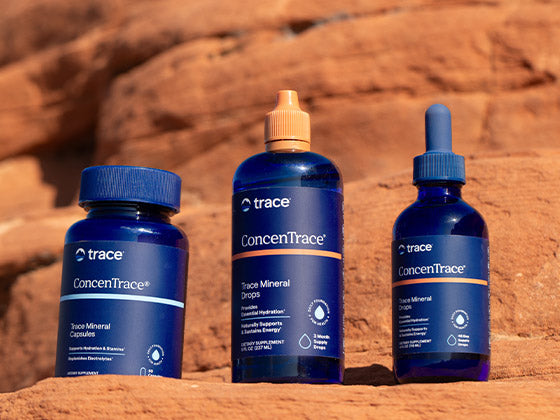Common mineral deficiencies can lead to symptoms like fatigue, brain fog, weakened immunity, poor sleep, and even mood disorders. The body requires a steady supply of minerals to function properly, yet the average diet often doesn’t deliver.
In a nation where processed foods are the norm and nutrient-rich options are often an afterthought, mineral deficiencies are more common than most people realize. Even those who eat clean may fall short on essential nutrients due to soil depletion, modern farming practices, and poor absorption.
In this article, we’ll explore the most common mineral deficiencies affecting Americans, what causes them, and how tools like Trace Minerals’ ConcenTrace® Daily Mineral Powder can potentially help.
Key Takeaways:
- Mineral Deficiencies Are Widespread: Even a balanced diet may not provide enough essential minerals.
- Key Minerals Matter: Magnesium, iron, zinc, calcium, and potassium are among the most commonly deficient.
- Trace Offers A Solution: ConcenTrace® Daily Mineral Powder is a simple way to complement your daily mineral intake and support overall wellness.
A Look At Common Mineral Deficiencies: Why Minerals Matter
Minerals are involved in nearly every biological function your body performs—muscle contraction, nerve signaling, immune defense, and hydration, just to name a few. When you're deficient in even one essential mineral, it can have a ripple effect across multiple systems.
What makes these deficiencies especially challenging is that they often develop slowly and silently. You might experience fatigue, poor concentration, or frequent illness and never suspect your mineral levels are low.
To better understand how mineral imbalances may be affecting your health, let’s take a look at the most common mineral deficiencies, how they show up in the body, and what you can do to get back in balance
1. Magnesium Deficiency
Magnesium plays a role in over 300 enzymatic reactions in the body, including those related to energy production, muscle function, and sleep regulation. It also helps regulate blood pressure and maintain a healthy nervous system.
Despite its importance, magnesium deficiency is extremely common. Factors such as high stress, caffeine consumption, alcohol use, and certain medications can further deplete magnesium levels. Symptoms of deficiency include muscle cramps, fatigue, insomnia, and irritability.
How To Restore It: Eat more leafy greens, seeds, legumes, and whole grains. Supplementation with ConcenTrace® is an effective way to ensure you're getting highly absorbable magnesium daily.
2. Iron Deficiency
Iron is essential for the production of hemoglobin, the protein that carries oxygen in your blood. Without it, you may experience fatigue, shortness of breath, and poor concentration. Women of childbearing age are especially prone to deficiency due to menstruation.
Vegetarians and vegans are also at greater risk since plant-based sources of iron are not as easily absorbed as those from meat. Combining iron with vitamin C can improve absorption.
How To Restore It: Eat red meat, lentils, fortified cereals, and dark leafy greens. Blends containing ionic iron can help replenish levels more gently than high-dose iron supplements.
3. Zinc Deficiency
Zinc is crucial for immune function, wound healing, taste perception, and skin health. A lack of zinc can lead to frequent colds, slow healing, loss of appetite, and even skin irritation.
Common in older adults, people with gastrointestinal issues, and those following restrictive diets, zinc deficiency can fly under the radar for years.
How To Restore It: Include more pumpkin seeds, shellfish, meat, and legumes in your meals. ConcenTrace® contains trace levels of zinc that can complement dietary intake.
4. Calcium Deficiency
Calcium supports strong bones and teeth, muscle contraction, and nerve transmission. Deficiency increases the risk of osteoporosis, especially in aging adults and postmenopausal women.
Signs of low calcium include brittle nails, muscle spasms, and tingling in the fingers. Often, people unknowingly reduce dairy or calcium-rich foods due to dietary preferences or lactose intolerance.
How To Restore It: Add dairy, almonds, tofu, and leafy greens to your diet. Mineral powder with ionic calcium can help as well.
5. Potassium Deficiency
Potassium regulates fluid balance, nerve signals, and muscle contractions. It is especially important for maintaining healthy blood pressure and heart rhythm.
Low potassium can result in fatigue, muscle weakness, constipation, and irregular heartbeat. It is commonly depleted through sweat, illness, or the use of diuretics.
How To Restore It: Eat more bananas, sweet potatoes, beans, and avocados. A supplement like ConcenTrace® offers natural, ionic potassium.
6. Iodine Deficiency
Iodine is essential for healthy thyroid function, which regulates metabolism and energy. Deficiency can lead to fatigue, weight gain, and a swollen thyroid (goiter).
Iodine deficiency has seen a resurgence due to reduced consumption of iodized salt and an increase in sea salt use, which often lacks iodine.
How To Restore It: Use iodized salt or eat seaweed and seafood. ConcenTrace® provides trace amounts of iodine to help maintain balance.
7. Selenium Deficiency
Selenium is a powerful antioxidant that supports the immune system and thyroid health. Its deficiency can result in weakened immunity, brain fog, and inflammation.
Selenium levels depend heavily on the soil in which food is grown, making deficiency more likely in certain geographic areas.
How To Restore It: Brazil nuts are an excellent natural source. Supplementing with a full-spectrum mineral product can aid in overall support.
8. Chromium Deficiency
Chromium helps regulate blood sugar levels and supports metabolism. A lack of chromium may lead to poor glucose control, weight gain, and cravings.
Refined sugars, white flour, and processed foods contribute to chromium loss. As a result, many Americans are unknowingly deficient.
How To Restore It: Include more whole grains, broccoli, and grape juice. Mineral powders containing trace chromium may support better glucose metabolism.
9. Phosphorus Deficiency
Phosphorus works with calcium to build strong bones and teeth and helps produce ATP, the body’s energy molecule. Symptoms of deficiency include joint pain, fatigue, and muscle weakness.
Low phosphorus levels can result from antacid use, alcohol abuse, and certain chronic illnesses.
How To Restore It: Include dairy, nuts, fish, and meat in your meals. Supplementation may be necessary for those with underlying absorption issues.
10. Copper Deficiency
Copper aids in energy production, immune response, and iron metabolism. It also plays a role in brain development and cardiovascular health.
Although rare, copper deficiency can mimic symptoms of other conditions like anemia and neurological disorders.
How To Restore It: Eat more nuts, seeds, shellfish, and whole grains. ConcenTrace® offers trace copper that may help support foundational wellness.
The Role Of Stress In Mineral Depletion
Chronic stress has a measurable impact on the body’s mineral reserves. Magnesium, in particular, is rapidly depleted during periods of emotional or physical stress, which can further exacerbate symptoms like fatigue and tension. Stress also impacts digestion, reducing the body’s ability to absorb minerals efficiently.
Supporting your mineral intake with a comprehensive formula like ConcenTrace® is a simple way to help maintain balance and overall well-being. Replenishing key minerals can complement your daily routine, supporting natural energy and a sense of calm.
Filtered Water And Mineral Loss
Many Americans rely on filtered or bottled water to avoid contaminants, but few realize that this practice also removes beneficial minerals like calcium, magnesium, and potassium. While filtration is essential for safety, it leaves water “empty” of the electrolytes our bodies need to stay hydrated at the cellular level.
Replenishing these lost minerals with a trace mineral supplement can help restore proper hydration, nerve signaling, and overall mineral balance.
Mineral Deficiencies And Modern Agriculture
The quality of the food we eat is directly tied to the soil in which it’s grown. Unfortunately, modern farming practices, including over-farming, synthetic fertilizers, and pesticide use, have led to widespread soil depletion. As a result, even healthy foods like fruits and vegetables often contain fewer minerals than they did in the past.
This growing nutritional gap means that even clean eaters are at risk for common mineral deficiencies. Using a supplement that sources minerals from naturally rich environments, like the Great Salt Lake, helps make sure you take in trace elements your diet may no longer provide.
The Link Between Medications And Mineral Depletion
Many commonly prescribed medications can interfere with the body’s ability to absorb or retain essential minerals. For instance, diuretics can lead to potassium and magnesium loss, while antacids may reduce calcium and phosphorus absorption. Over time, these subtle losses can add up, leading to symptoms that resemble unrelated health conditions.
Certain lifestyle factors, including the regular use of some medications, may influence your mineral levels. A daily mineral powder like ConcenTrace® offers a simple way to help support balanced mineral intake.
Final Thoughts
The truth is, even a healthy diet doesn’t always protect you from common mineral deficiencies. Whether due to soil depletion, lifestyle factors, or chronic stress, many Americans don’t get enough of the essential minerals their bodies need to function well.
With ConcenTrace® Daily Mineral Powder, Trace Minerals provides a clean and convenient way to support your daily mineral intake. Easy to use, rich in ionic trace minerals, and free from unnecessary additives, it’s a simple addition to an everyday wellness routine.
Read also:
- Magnesium And Mental Health: Natural Support For Mood, Sleep, And Stress
- Top Supplements And Minerals To Support A Healthy Nervous System
- Muscle Recovery Made Easy: Essential Minerals And Supplements That Work
Frequently Asked Questions About Common Mineral Deficiencies
What are the most common mineral deficiencies in the U.S.?
The most common mineral deficiencies include magnesium, iron, calcium, zinc, and potassium. These deficiencies are often due to poor dietary choices, soil depletion, and stress. Even individuals who follow healthy diets can experience shortages due to absorption issues or lifestyle factors.
How do I know if I have a mineral deficiency?
Common signs include fatigue, frequent illness, muscle cramps, mood swings, and sleep disturbances. Blood tests can confirm certain deficiencies, but many early symptoms may be overlooked. Working with a healthcare provider and supplementing mindfully can help restore balance.
Why are Americans so deficient in minerals?
The rise in processed foods, over-farming, and reliance on filtered water have contributed to widespread deficiencies. Stress, medications, and environmental toxins also increase mineral needs. Together, these factors make it difficult to get adequate minerals from diet alone.
Can supplements really help with mineral deficiencies?
While a balanced diet is the foundation of good nutrition, supplements like ConcenTrace® can offer additional support. Its ionic minerals are designed for easy use by the body, helping to complement what food may lack.
Are the symptoms of mineral deficiency easy to detect?
Not always. Many symptoms are subtle, like low energy or poor concentration, and may be mistaken for stress or aging. Over time, more serious issues can develop, which is why early support is important.
Is it possible to get too many minerals?
Yes, though it’s rare from food or trace mineral supplements when taken as directed. Excessive intake from high-dose synthetic supplements can cause toxicity. Always follow dosing instructions and talk with your doctor if unsure.
Who is at the highest risk of mineral deficiencies?
Women, older adults, athletes, and those with digestive conditions or restricted diets are most at risk. Stress, illness, and medication use can also deplete mineral stores. These groups benefit most from targeted supplementation.
What’s the best way to get more minerals every day?
Combine a mineral-rich diet with a supplement like ConcenTrace®. Foods like leafy greens, nuts, legumes, and seafood are good sources. Supplementing fills in the gaps and helps maintain consistency.
How long does it take to feel better after correcting a deficiency?
Results vary, but many people notice improvements in energy, focus, and sleep within a few days to a few weeks. Consistent intake is key to long-term benefits.
What makes ConcenTrace® effective for mineral replenishment?
ConcenTrace® delivers 72 ionic trace minerals sourced from Utah’s Great Salt Lake. It’s highly absorbable, clean, and free of fillers or artificial ingredients. It’s a trusted option for natural support.
Sources:
- U.S. National Library of Medicine. (2023, June 15). Iron deficiency anemia. MedlinePlus. Retrieved July 18, 2025, from https://medlineplus.gov/ency/article/000315.htm
- Kiani, A. K., Dhuli, K., Donato, K., Aquilanti, B., Velluti, V., Matera, G., Iaconelli, A., Connelly, S. T., Bellinato, F., Gisondi, P., & Bertelli, M. (2022). Main nutritional deficiencies. Journal of preventive medicine and hygiene, 63(2 Suppl 3), E93–E101. https://doi.org/10.15167/2421-4248/jpmh2022.63.2S3.2752
- Lopresti A. L. (2020). The Effects of Psychological and Environmental Stress on Micronutrient Concentrations in the Body: A Review of the Evidence. Advances in nutrition (Bethesda, Md.), 11(1), 103–112. https://doi.org/10.1093/advances/nmz082
- Klinkenborg, V. (2021, March 1). How the loss of soil is sacrificing America’s natural heritage. Yale Environment 360. Retrieved July 18, 2025, from https://e360.yale.edu/features/how-the-loss-of-soil-is-sacrificing-americas-natural-heritage






